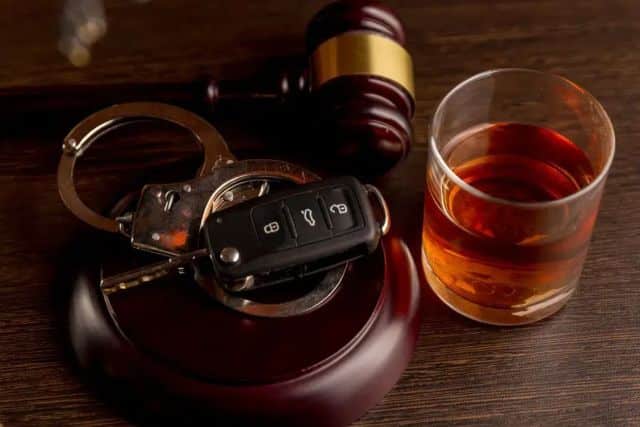












Understanding DUI Regulations
Every day, drivers of commercial vehicles face the responsibility of maneuvering vehicles that can weigh up to 40 times that of a standard car, all while navigating busy roads and ensuring the safety of those around them. Add alcohol into the equation, and the stakes soar alongside the legal ramifications. Federal regulations are unyielding: operating a commercial vehicle with a blood alcohol concentration (BAC) of 0.04% or higher is considered driving under the influence (DUI), a standard that’s notably more stringent than the 0.08% limit for non-commercial drivers.
Given the gravity of these potential consequences, it’s not just about adhering to the law; it’s about upholding the safety and trust that the occupation demands. Alcohol impairs judgment, reaction times, and coordination, making the operation of commercial vehicles, such as tractor-trailers, buses, and tankers, not merely illegal but dangerously unethical beyond a certain BAC level. How much is too much when the lives of others hinge on your sobriety behind the wheel?
We at the Missouri DWI & Criminal Law Center understand the critical nature of these BAC limits and how they serve as a benchmark for safety and legality on the roads. Our experience has shown us the profound impact a DUI can have on the livelihood of commercial drivers. And so, we delve into the facets of this topic, committed to bringing clarity and guidance to those who need it most.

What Is BAC and Why Does It Matter?
Blood Alcohol Concentration (BAC) quantifies the presence of alcohol in one’s bloodstream. This measurement is pivotal because it correlates directly with the impairment of motor skills and cognitive functions essential for safe driving.
The minute we consume alcohol, it enters the bloodstream through the stomach and intestines, rapidly impacting our coordination, judgment, and reaction times. Diverse factors affect BAC levels, including body weight, medical conditions, and how quickly alcohol is consumed. But why does this matter so much, especially for commercial vehicle drivers?
The stakes are towering for those responsible for maneuvering commercial vehicles. The threshold for lawful operation is more stringent, underscoring the elevated expectations society has entrusted in these professional operators.
Federal regulations mandate a BAC no higher than 0.04% for commercial drivers, emphasizing the critical need for absolute sobriety behind the wheel. While a pedestrian’s lapse in concentration may have minimal consequences, the potential repercussions could be catastrophic for a commercial driver, endangering countless lives and resulting in severe legal consequences.
The connection between BAC and safe vehicle operation cannot be overstated. Whether a driver is bobbing through Missouri backroads or elsewhere, BAC levels are a safety barometer safeguarding us all from the perilous winds of intoxication. Understanding and adhering to these limits is vital, as even one’s livelihood could hinge on the pivot of responsible decision-making.
The Arrest Process for Commercial DUI in Missouri
When a commercial driver is suspected of DUI, the initial step is an investigative stop. Law enforcement officers will watch for signs of impairment, such as erratic driving or traffic violations. If they have reasonable suspicion, they’ll proceed with a traffic stop. Once stopped, officers may ask the driver to perform field sobriety tests and submit to a breathalyzer or chemical test. It’s vital to note that for a commercial vehicle driver like a truck driver, a blood alcohol concentration (BAC) of 0.04% is considered illegal, which is half the limit set for non-commercial drivers.
Upon failing or refusing the tests, the driver is typically placed under arrest. At this point, our guidance becomes crucial, as an arrest for DUI triggers administrative and criminal procedures. Initially, the arresting officer will issue a notice of revocation of the driver’s commercial license, commonly starting a chain reaction of legal and occupational challenges.
Subsequently, the driver will be taken into custody and booked. After booking, they often have the opportunity to post bail. It is critical for any commercial driver to seek knowledgeable legal defense, as the implications of a conviction can be severe, affecting their livelihood. Securing an experienced attorney can provide a pathway through the complex legal landscape.
Drivers facing these grave circumstances benefit from understanding their rights and the procedures that law enforcement must follow. With the right legal representation, they can navigate the intricacies of Missouri’s DUI laws and formulate a defense strategy that may help protect their professional and personal future.

Facing a DUI Charge? Contact Us Today and Let Us Fight for You
Understanding your rights when confronted with a DUI charge is crucial. Frequently, the experience of your defense team. Operating a commercial vehicle entails adherence to stricter legal alcohol limits compared to non-commercial driving. For commercial drivers, the legal Blood Alcohol Content (BAC) limit is 0.04% nationwide, half the limit set for non-commercial drivers.
As a professional, being charged with DUI can threaten not only your license but also your livelihood. You may feel overwhelmed and wonder if mitigating the situation is possible. That’s where skilled legal representation can make a crucial difference. Our approach includes:
- Thoroughly examining the circumstances of your charge
- Questioning the validity of the test results
- Interpreting complex regulations that apply to commercial drivers
When challenging a DUI charge, it is essential to have a defense that understands both the implications of the charge and the nuances of the law. We delve into the specifics of each case with a sharp focus, from the initial stop to the breathalyzer or other chemical tests administered.
If you’re seeking a legal team combining knowledge and determination, consider contacting us. As your representatives, we’ll aim to safeguard your rights and pursue every avenue available to navigate these charges. Don’t allow a DUI charge to upend your career without fighting back.
For professional assistance and a detailed understanding of your charge, we encourage you to connect with us. Together, we can forge a path toward a resolution that prioritizes your future and peace of mind.







